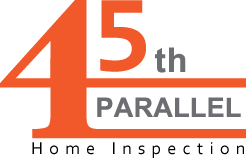Radon Testing Services
Why are Radon Inspections Important?
At 45th Parallel, we understand the importance of maintaining a safe and healthy indoor environment for you and your loved ones. That’s why radon testing is so critical. Additionally, the EPA recommends Radon testing for every real estate transaction.
Radon is a radioactive, silent, odorless, and invisible gas that occurs naturally in air, soil, and water. To be super brief and simple, it occurs as a natural process of decay in elements and starts with Uranium. It just takes a very, very long time to end up as Radon because of the very long half life of Uranium.
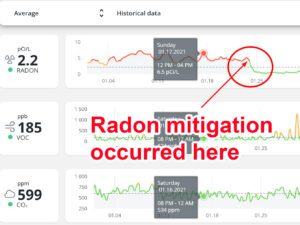
That decay process takes billions of years. When present at higher levels in homes or commercial structures, Radon can pose a serious threat to your health and the well-being of your family.
According to the Surgeon General, radon is the second leading cause of lung cancer death behind smoking. It’s estimated that more than 20,000 people die from radon-related lung cancer per year.
Now for some good news:
- Testing for radon is easy
- Testing is very inexpensive
- Mitigation is relatively inexpensive, easy and highly effective
Why Choose Our Radon Testing Service?
We perform radon testing with state-of-the-art, industry-leading continuous radon monitors, making it possible to have your results within two days. It’s recommended that all radon tests take a minimum of 48 hours to provide a quick snapshot of the radon concentration in the structure. In fact, that is the minimum time allowable for real estate transactions.
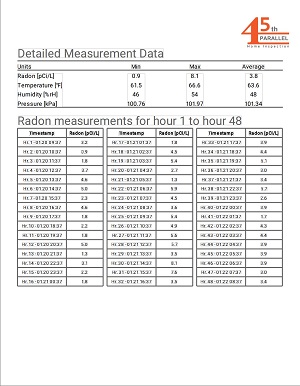 Longer term testing is better, but real estate transactions move quickly, so a 48 hour snapshot is the most that most transactions have time for. We do offer longer term testing, but that would likely be applicable for when a customer is already living in a home.
Longer term testing is better, but real estate transactions move quickly, so a 48 hour snapshot is the most that most transactions have time for. We do offer longer term testing, but that would likely be applicable for when a customer is already living in a home.
Your radon test report will be delivered in electronic PDF format and include hourly readings of radon concentration, temperature, and humidity, and even shows any motion events that would indicate potential tampering. Other clues such as a rapid change in temperature could also indicate tampering due to actions such as opening and leaving open windows.
At 45th Parallel, we understand the importance of Radon testing to protect your home and family. We’ve built our company on providing honest, fair, and thorough inspections. Your health and safety is one of our top priorities, which is why we, along with the EPA recommend Radon testing for every real estate transaction.
“Russ & his team are the most thorough, conscientious, and high-quality inspectors I have encountered. They just did a general inspection, radon test, and sewer scope on my family's next home and I couldn't be happier.” - Matt B., Vancouver, WA
Radon testing is not just for real estate transactions. If you live in a home that has never been tested for Radon, we can perform testing for you. Every homeowner is recommended to have at least one test performed to get an idea of the Radon levels in the home.
Frequently Asked Questions (FAQ)
Common questions about radon testing from buyers and sellers alike
The U.S. Environmental Protection Agency (EPA) recommends that radon levels in homes should not exceed 4 picocuries per liter (pCi/L). If your test results show levels at or above this threshold, you should consider taking action to reduce radon exposure.
The EPA recommends testing your home's radon levels at least every two years, especially if you live in an area with a known radon problem or have made structural changes to your home.
While DIY radon test kits are available, it's recommended to hire a certified professional for accurate and reliable results. We have the expertise to ensure the test is conducted correctly.
If our radon inspection reveals elevated levels of radon in your home, we’ll guide you through the mitigation process. We'll explain the available mitigation methods, their costs, and the expected outcomes. We're here to answer all your questions and help you make informed decisions.
Basement and slab on grade homes are generally the highest in Radon. That is because they have so much concrete in contact with soil, and Radon concentration is higher in soil because it cannot freely dissipate. Radon seeps in at concrete cracks, joints, and penetrations around piping and can accumulate in higher concentrations once in the home.
In general, ventilated crawl space homes are almost never high in Radon concentration. The reason is that Radon is free to dissipate into the atmosphere due to the ventilation under the home. We recommend not using styrofoam blocks to plug the crawl space vent screens because that reduces airflow and ventilation and can allow Radon levels to increase.
The only time we feel it is OK to use the styrofoam blocks is for a cold snap where you put them in place and then remove them once it warms back up a little to not be a concern for freezing pipes.
If you live in a crawl space home, do not use styrofoam blocks to plug the crawl space vent screens all winter. Assuming your home has insulation under the floor and the water piping is insulated, you don’t need to plug the vents. Plugging the vents reduces airflow under the home and can allow Radon to concentrate in higher levels in the home. It’s fine to plug the vents during a cold snap to prevent any pipes from freezing etc, but when it warms back up, remove them.
Home ventilation system which brings in fresh air also helps to discharge older stale air which also contains Radon. You can open a window and ventilate basements and allow the house to air out during good weather as well. But we still recommend Radon testing under closed house conditions and mitigation if levels are elevated.
Get answers from an Inspection Specialist
Give us a call today to answer any questions you have regarding home inspections, Radon testing, or sewer line inspections.
We're Certified Inspectors
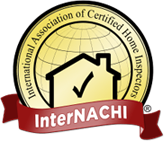
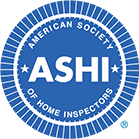
Schedule an Inspection Today
We are ready to schedule an inspection for you. Click the button and you can choose your date and time and do everything online. Or give us a call and we can schedule it for you.
At 45th Parallel Home Inspection, we are committed to providing you with comprehensive and accurate inspection reports. Our expertise in home inspections can help protect your home investment. Contact us today to schedule your inspection.
